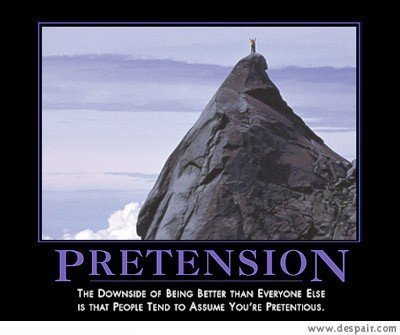Pretentiousness in Music
October 13, 2015

Courtesy of U2 Gospel
Being fair with myself, I was really a pretentious asshat in my first two years of high school. I still retain a bit of that today, but it definitely shaped my musical tastes (and I’ve now learned you can like non-mainstream music without being a dick about it). But it’s not just pretentiousness about music that people complain about; it’s pretentiousness in the music. People don’t like being talked down to or feeling stupid. You’ll read reviews that say the lyrics or construction of an album is pretentious or esoteric. There are two artists—two of my favorite actually—that are perfect examples of this.
The first artist is Titus Andronicus, whose most recent record, The Most Lamentable Tragedy, has gotten a lot of flak from critics. The 90-minute rock opera has gotten very mixed reviews, ranging from perfect 10’s that hail the record as a masterpiece to below-average 4’s that complain about the album’s length and complex plot. Despite the record being one of my favorites of the year (I do have the poster that came with the vinyl pressing hanging in my dorm), I can actually agree with the less-favorable reviews. It is a super tiring record. I often find myself listening to individual acts instead of the album as a whole—it is not an easy album to digest. Chock full of musical interludes, dream sequences, and references to previous Titus Andronicus records. I need a nap when I’m done listening to the whole thing. But being hard to digest does not mean it is bad. It may mean it is not for everyone, but even books like James Joyce’s Ulysses are still hailed as masterpieces of literature. Sure, they’re not beach reads, but for every Nicholas Sparks book, there is an inventive, thought-provoking piece of literature.
The second artist, also not surprisingly, is English singer-songwriter Frank Turner. While not necessarily receiving negative views for his lyrics, it would be inaccurate to say that the man does not include borderline-esoteric historical references in his lyrics. He studied history at the London School of Economics, after all. One of the best examples of a reference completely shedding a new light on the meaning of a song is the title track from his second album, Love Ire & Song:
So, come on, old friends, to the streets
Let’s be 1905, but not 1917.
Let’s be heroes, let’s be martyrs, let’s be radical thinkers
Who never have to test drive the least of their dreams
Let’s divide up the world into the damned and the saved
And then ride to the valley like the old light brigade!
And straighten our backs and we won’t be afraid
And they’ll celebrate our deaths with a national parade!
So, in addition to being a criticism of “idiot fucking hippies” and “the kids on the left,” Frank is making references to the multiple Russian Revolutions. Here, he talks about the failed Russian Revolution of 1905 and wants this “revolution” to fail. He wants the experience of revolting, but has accepted it isn’t truly ideal to actually overthrow anything. But this nuanced reference which adds a new dimension to the song is lost on those who aren’t educated in Russian history. While I’m sure more people in Europe know the dates of the Russian Revolution to the level we know the dates of the American Revolution, not everybody who hears the song will know that. Especially across the pond.
However, I argue that by including these references, Turner and Stickles are encourage people to become educated on European History, the operatic form, and Shakespearean plays. The, while definitely not in the pop culture lexicon, have enough of a following that I’m sure that has happened to more people than just me.














